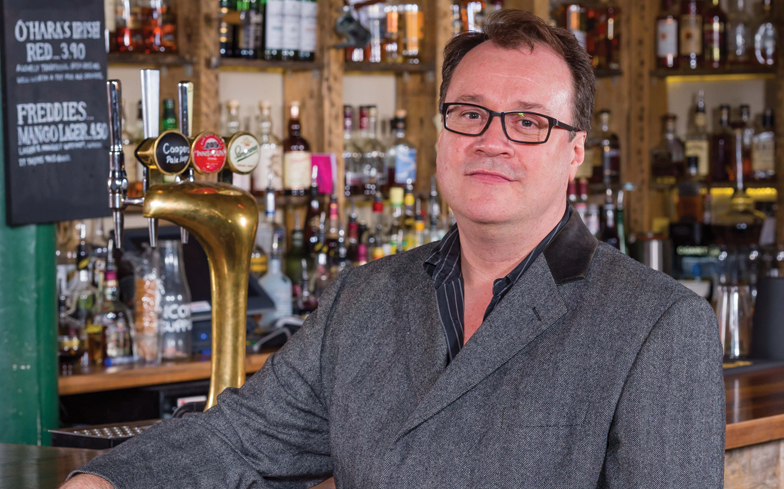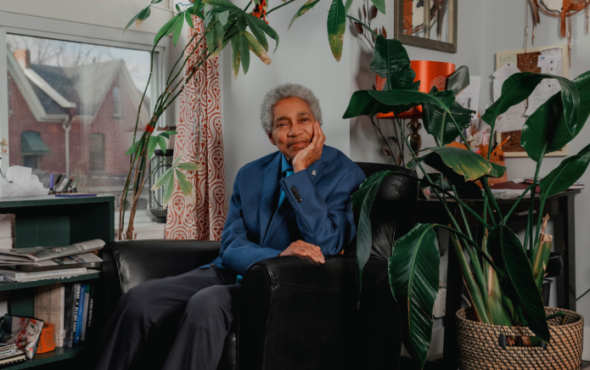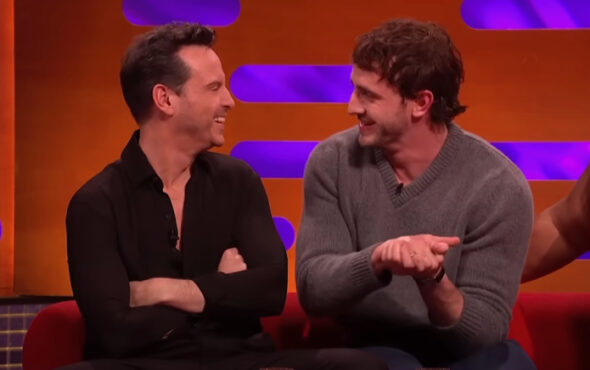
When the idea of telling the real-life secret love affair (and its subsequent fallout) of a former political figure and a stableboy through a three-part drama series was pitched, there was only one man for the job.
Russell T Davies has become the Godfather of British gay drama, having had massive success stories with Queer As Folk and Cucumber, as well as rebooting Doctor Who for a whole new generation of fans.
His latest project sees him as the writer and showrunner on the Sony Pictures Television/BBC production of A Very English Scandal, about the affair and subsequent murder allegations between Liberal Party leader Jeremy Thorpe and Norman Scott.
In this exclusive interview for Gay Times ahead of the DVD release of A Very English Scandal, Russell T Davies talks about the reasons why he wanted to be a part of the project, meeting the real-life Norman Scott, and the controversy surrounding the story.
Why tell this story and why tell it now?
It’s men and power. It’s never a story that goes away. I had a meeting with the BBC about writing this on the day that Keith Vaz was reported as sleeping with boys and pretending he was a washing machine repairman. It’s the same story, nothing’s changed. It’s also a bit of a piece of history – but when you think of like the madness of the White House now and the madness in Downing Street, it’s like we never have enough of these stories. Men in power lie, have sex – add a dead dog and you’re away.
How was it juggling the tone between light and dark?
It’s very much from the book by John Preston. It’s a great book. People who were around at the time say it’s very good. And the mix is in the title, which shows how funny it is and how serious it is. The story is hilarious in places. It’s also a bit sad. Lives are ruined by this. When I read it, I thought: that’s the way I write. I don’t have to work hard to chime with it, because I love writing stuff that’s funny one minute and sad the next. Literally I was about five pages in and I thought: oh, I’m doing this.
Did they approach you or did it start with you?
I had always been interested in this story. I asked the BBC about it back in 2009 but Jeremy Thorpe was still alive then, so it was much more difficult to write about. Then when this came along, I was busy. And Dominic Treadwell Collins, who’s the executive producer and a clever bastard sent me the book. Five pages in, the assassination has failed, they’ve killed the dog, Norman Scott’s at the police station and his landlady turns up, goes to the desk and says, ‘I’m Mrs Edna Friendship.’ That’s her real name: Mrs Edna Friendship. And when I read that I thought – if anyone else writes this, I’ll be so livid.
You must have had a deluge of material…
There’s an awful lot to cut out. Like any real-life story, it’s so mad and there’s so many details, I genuinely had to streamline it. partly to get it into three hours. But yeah, an awful lot cut. I really hope people go and buy the book and read the detail. You could read about forever.
When you were writing it, did you have anyone in mind?
No I don’t do that, to be honest. I was trying to genuinely channel the real-life people and to do them justice. I’m here to understand why they did what they did because the books don’t necessarily do that. And there were moments where people act very oddly and very madly and very strangely. But that’s why I’m a writer. That’s meat and gristle to me, that’s why I’m here. Then one of the producers said – shall we send it to Hugh Grant? I said – Oh, I don’t know. I’ll have to think. [Laughter] Then Stephen Frears picks up his phone and goes, ‘Hugh, love. Come and do this.’ [Laughter] And off they go.

Did you meet or spend time with Norman Scott?
I did. We met Jeremy Thorpe’s son, we met Peter Bessell’s son – although Norman’s actually the only survivor. We spent time with Norman, to be diligent. It’s very important to be clear that he didn’t have any say in the matter. He wasn’t sent scripts for approval. And we were very honest about that from the start. We said, ‘We’re not here to make your life story, we’re here to tell the story. And we might have to be unsympathetic towards you at times.’ But he was very adult and responsible about it.
I loved him. I love gay men. It’s why I write what I write. Many times Norman Scott’s been vilified by straight men – straight journalists in particular. It’s very hard to find pro-Norman Scott articles. I met him and understood him from the moment I shook his hand. This 73-year-old gay man from this kind of society, of that kind of sexuality, of that kind of sense of humour, I get you. You’re not rare and strange. But it’s not a kangaroo court. It’s not a retrial. It’s a chance to examine why men do these things – which is almost every drama ever written, in the end.
Did you expect any controversy?
I think the story creates controversy, even after all these years wherever it goes. It touches on the establishment, it touches on sexuality, it touches on politicians. There will be people who will say, ‘I was there.’ I mean I can’t begin to tell you the amount of conspiracy theories, the letters and stuff, you get about this. It excites something in people. But I think in the end it’s just a great piece of history. I thought we told the truth. That’s what’s interesting about it.
A Very English Scandal will be released on DVD and Blu-ray on 2 July, and is available to pre-order now.



